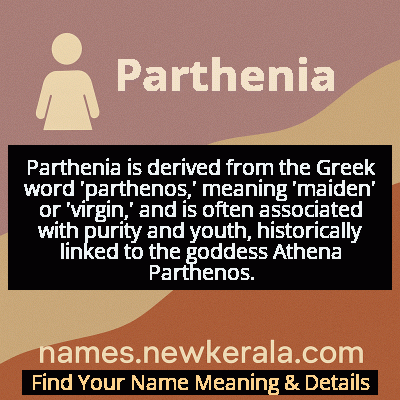Parthenia Name Meaning & Details
Origin, Popularity, Numerology Analysis & Name Meaning of Parthenia
Discover the origin, meaning, and cultural significance of the name PARTHENIA. Delve into its historical roots and explore the lasting impact it has had on communities and traditions.
Name
Parthenia
Gender
Female
Origin
Greek
Lucky Number
2
Meaning of the Name - Parthenia
Parthenia is derived from the Greek word 'parthenos,' meaning 'maiden' or 'virgin,' and is often associated with purity and youth, historically linked to the goddess Athena Parthenos.
Parthenia - Complete Numerology Analysis
Your Numerology Number
Based on Pythagorean Numerology System
Ruling Planet
Moon
Positive Nature
Diplomatic, friendly, artistic, empathetic.
Negative Traits
Over-sensitive, moody, indecisive, prone to self-pity.
Lucky Colours
Green, cream, white.
Lucky Days
Monday.
Lucky Stones
Pearl, moonstone.
Harmony Numbers
1, 3, 4.
Best Suited Professions
Diplomats, mediators, caregivers, artists.
What People Like About You
Cooperative spirit, friendliness, artistic talent.
Famous People Named Parthenia
Parthenia
Ancient Greek musician
Renowned harpist mentioned in historical records from 3rd century BCE
Parthenia Wilson
Educator
Established pioneering educational institution for women in 19th century America
Parthenia Carr
Botanist
Significant contributions to medicinal plant research and conservation
Name Variations & International Equivalents
Click on blue names to explore their detailed meanings. Gray names with will be available soon.
Cultural & Historical Significance
Extended Personality Analysis
Those named Parthenia typically develop personality traits reflecting their name's classical heritage and meaning. They often demonstrate exceptional intellectual curiosity and a love for learning, frequently excelling in academic environments. Their inherent sense of integrity makes them principled individuals who stand by their convictions, even when facing opposition. Parthenias tend to be selective in their social circles, preferring deep, meaningful relationships over casual acquaintances. They often possess strong creative abilities, particularly in writing, music, or visual arts, and may use these talents as outlets for self-expression. While sometimes perceived as reserved or serious, they reveal warm, loyal natures to those who earn their trust. Their independence can manifest as self-sufficiency and determination in pursuing personal and professional goals. Many Parthenias develop leadership qualities, often guiding others through example rather than authority. They typically maintain high personal standards and expect the same from those around them, creating relationships built on mutual respect and shared values.
Modern Usage & Popularity
In contemporary naming practices, Parthenia remains exceptionally rare but maintains a dedicated following among parents seeking historically significant and distinctive names. Current usage trends show it appears most frequently in academic families, those with Greek heritage, or parents particularly interested in classical mythology and history. The name's rarity makes it virtually unique in most social contexts, which appeals to parents wanting their child to have a memorable identity. While not appearing on any national popularity charts, Parthenia sees occasional use in artistic and intellectual communities where classical references are appreciated. Modern Parthenias often embrace their name's uniqueness, though some may use shortened forms like 'Thena' or 'Parthy' for everyday convenience. The name's strong feminist connotations—referencing an independent, powerful goddess—resonate with contemporary values while maintaining traditional roots. Its current obscurity positions it as a sophisticated choice for parents looking beyond trending names toward something with enduring cultural significance and distinctive character.
Symbolic & Spiritual Meanings
Symbolically, Parthenia represents multiple layers of meaning beyond its literal translation. It embodies the concept of being 'whole unto oneself'—a symbolic representation of completeness and self-sufficiency that doesn't require external validation. The name carries strong associations with wisdom and strategic thinking, reflecting Athena's role as goddess of wisdom and tactical warfare. It symbolizes the preservation of purity in its broadest sense: purity of intention, artistic vision, intellectual pursuit, and moral character. Parthenia also represents cultural continuity, serving as a living connection between modern naming practices and ancient Greek civilization. In metaphorical terms, the name suggests someone who maintains their core identity unchanged by external influences—a person of consistent character and unwavering principles. It symbolizes the ideal of feminine strength that doesn't conform to traditional gender expectations but creates its own path. The name also carries subtle musical symbolism, referencing both ancient Greek musical traditions and the harmonious balance of classical virtues in one's character.

